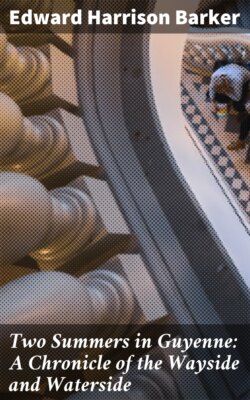Читать книгу Two Summers in Guyenne: A Chronicle of the Wayside and Waterside - Edward Harrison Barker - Страница 3
На сайте Литреса книга снята с продажи.
PREFACE
ОглавлениеTable of Contents
Of the four summers which the writer of this 'Chronicle of the Wayside and Waterside' spent by Aquitanian rivers, the greater part of two provided the impressions that were used in 'Wanderings by Southern Waters.' Although the earlier pages of the present work, describing the wild district of the Upper Dordogne, through which the author passed into Guyenne, belong, in the order of time, to the beginning of his scheme of travel in Aquitaine, the summers of 1892 and 1893, spent chiefly in Périgord and the Bordelais, furnished the matter of which this volume is mainly composed. Hence the title that has been given to it.
It may be thought that there is not a sufficient separation of interest, geographically speaking, between the tracts of country described in the two books. The author regrets that it is not possible to convey in a few words an idea of the extent of the old English Duchy of Aquitaine as it was defined by the Treaty of Brétigny. Still less easy would it be to deal rapidly with its physical contrasts, its relics of the past, and its historical associations. Surely no writer could pretend to have exhausted the interest of such a subject even in two volumes.
Before the final expulsion of the English, Aquitaine was gradually taking the name of Guyenne; but when this designation came to be definitively applied, at the time of the Renaissance, Gascony was not included in it, nor were Poitou, Saintonge, Angoumois and Limousin. Even when thus restricted in its meaning, Guyenne still represented a very considerable part of France, including as it did the regions or sub-provinces known as the Bordelais, Périgord, the Agenais, the Rouergue, and the Quercy.
If the author's work during the fifteen years that he has been living in France has served to make the people, the scenery, and the antiquities of this ever-fascinating country somewhat better known to those who speak the English language, he believes that it is to his favourite mode of travelling that such good fortune must be largely attributed. His faring on foot has caused him to see much that he would otherwise have never seen; it has also widened his knowledge of his fellow-men, and has helped him to control prejudices which are not to be entirely overcome, but ever remain an insidious snare to the traveller and student of manners.
